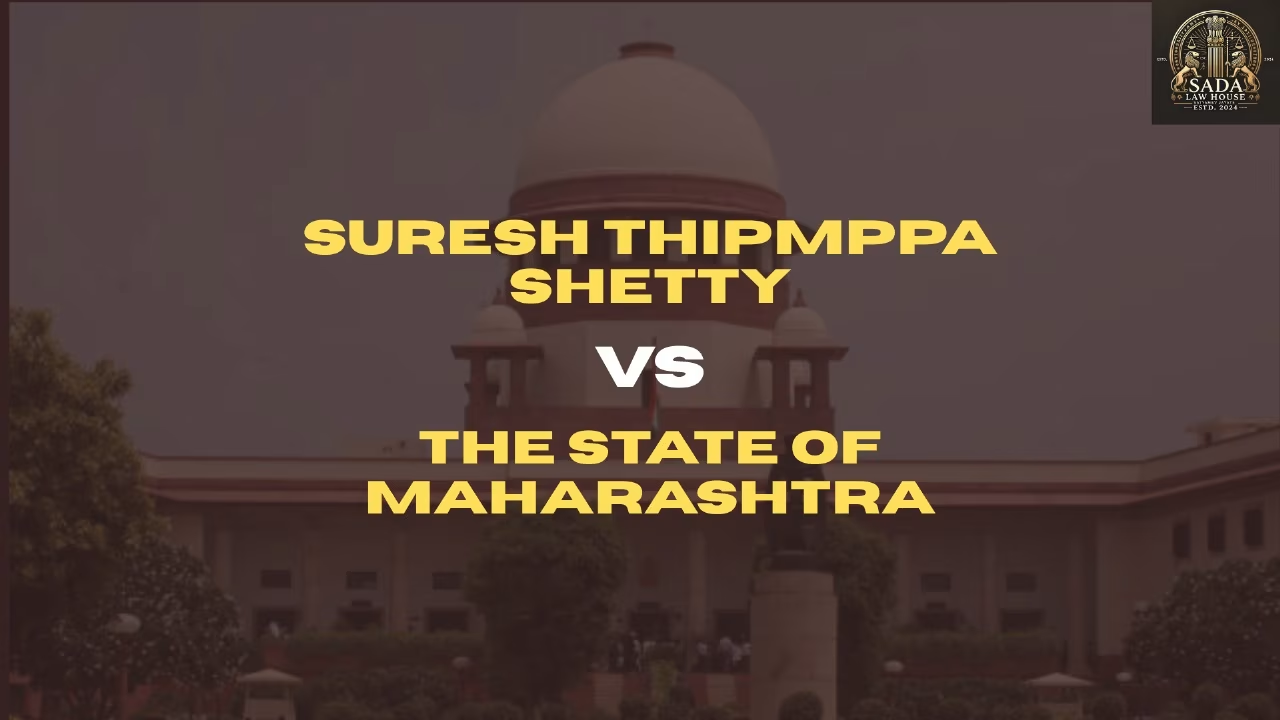Non-Compliance with Mandatory Safeguards Under the NDPS Act: Supreme Court Acquittal in Suresh Thipmppa Shetty v. State of Maharashtra
- REHA BHARGAV
- Sep 23, 2025

The Supreme Court of India acquitted Suresh Thipmppa Shetty on July 26, 2023, citing non-compliance with mandatory safeguards under the NDPS Act. Learn about the case, issues, judgment, and its impact on Indian criminal law.
Introduction
The case of Suresh Thipmppa Shetty v. State of Maharashtra is a landmark criminal appeal decided by the Supreme Court of India on July 26, 2023, presided over by Justice Vikram Nath.
The appellant, Suresh Thipmppa Shetty, was convicted under the Narcotic Drugs and Psychotropic Substances Act, 1985 (NDPS Act). The case revolved around allegations of possessing and transporting a commercial quantity of narcotic substances.
The judgment is significant because it highlights the mandatory procedural safeguards under the NDPS Act and stresses the importance of protecting the rights of the accused during search and seizure operations.
Facts of the Case
The prosecution alleged that acting on a tip-off, the Anti-Narcotics Cell of the Mumbai Police apprehended Shetty and recovered a substantial quantity of charas from his possession.
The search was conducted without a warrant, relying on urgency under Section 42 of the NDPS Act.
The Special NDPS Court convicted him, and the Bombay High Court upheld the decision.
The appellant challenged the conviction before the Supreme Court, citing non-compliance with procedural safeguards, particularly Section 50 of the Act.
Issues Before the Court
Whether Sections 42 and 50 of the NDPS Act were complied with during the investigation.
Whether failure to inform the accused of his right under Section 50 vitiates the search and conviction.
Whether the prosecution’s evidence was reliable and free from procedural lapses.
Whether the High Court was justified in upholding the conviction despite non-compliance.
Petitioner’s Arguments
The appellant argued:
He was not informed of his legal right under Section 50, which mandates that an accused be given the option of being searched before a Magistrate or a Gazetted Officer.
The search and seizure lacked proper documentation and independent witnesses.
The chain of custody of the contraband was broken.
The prosecution failed to prove beyond reasonable doubt that the seized substance was indeed a narcotic drug.
Respondent’s Arguments
The State of Maharashtra contended:
The officers acted on credible, urgent information, justifying action without a warrant under Section 42.
Section 50 was not applicable since the narcotic was recovered from a bag and not directly from the accused’s body.
The recovery was properly documented and corroborated by witness testimonies.
The absence of independent witnesses did not weaken the case, as the officers’ testimony was credible.
Judgment of the Supreme Court
On July 26, 2023, Justice Vikram Nath delivered the judgment:
The appeal was allowed, and Suresh Thipmppa Shetty was acquitted.
The Court ruled that Section 50 safeguards were violated, as the accused was not informed of his right to be searched in the presence of a Magistrate or Gazetted Officer.
The procedural lapse made the search and recovery illegal, rendering the conviction unsustainable.
The Court emphasized that compliance with Section 50 is mandatory, even if the contraband is found in a bag.
Conclusion
This judgment reinforces that strict compliance with procedural safeguards under the NDPS Act is essential to ensure a fair trial. The Supreme Court highlighted that non-compliance with Section 50 constitutes a fatal flaw in prosecution cases.
By acquitting the appellant, the Court reaffirmed that justice must be delivered through lawful procedures and that the rights of the accused cannot be overlooked, even in serious narcotics cases.
Case Laws






